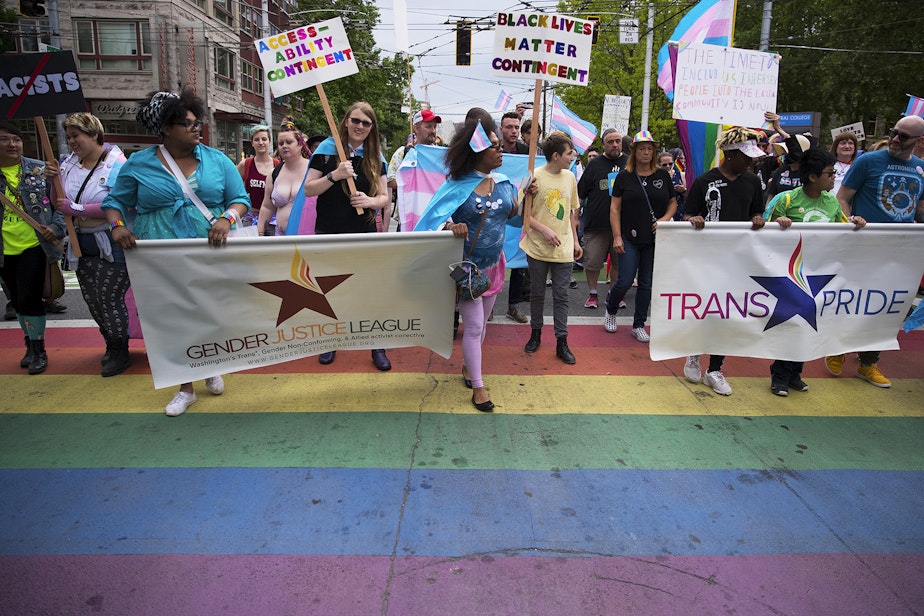Why trust between Seattle police and the LGBTQ+ Pride community has been crumbling

When Seattle's LGBTQ+ group Capitol Hill Pride requested police traffic control for a march at Seattle Central College in June, they were turned down, after an exchange of emails.
Last year, the organizers also filed a complaint after the event's organizer Charlette LeFevre asked SPD to comply with their ban on uniformed officers during their event. They didn’t get the response they were looking for from the Office of Police Accountability, which addresses these kinds of complaints.
RELATED: The many glowing faces of Seattle Pride
“You know, it's at this point that our trust is extremely low,” Lefevre said. “Unlike other people who grew up with a huge mistrust of the police, it was the opposite for me.”
It’s this crumbled trust that led Lefevre to ask for the removal of the department's LGBTQ liaison in August.
Sponsored
LeFevre said she grew up in a military family, and had an uncle who was an officer. She was sympathetic to the police.
“After 14 years of directly working, trying to work and communicate with not only SPD, but very specifically the East Precinct, my trust in them is not there anymore," LeFevre said.
RELATED: How government hurdles and online protesters changed the shape of Arlington Pride
The department's liaison does more work than being a partner with pride organizations. This officer is also a resource for Seattle area LGBTQ+ nonprofits when it comes to addressing hate crimes.
Organizers with the larger Seattle PrideFest say they’ve had a different experience working with SPD through community liaisons — thoughtful, engaging, and effective.
Sponsored
“Every year, we balance the need for safety of our attendees and the sensitivity many in our community have towards police presence at our events,” said Seattle PrideFest organizer Egan Orion. “Safety is our number one concern, but safety means different things to different parts of our communities, all of which we respect and integrate into our planning.”
But the friction between pride organizers and police extends beyond the liaison. Many small pride organizers don’t want to work with the department at all.
Organizers for Trans Pride Seattle said they’ve never found any engagement with SPD to be meaningful. Last year, they moved their event from Cal Anderson to Volunteer park.
“...Specifically so we would no longer have to engage with SPD,” said Kai April-Tomlin from the Gender Justice League, which organizes the event. “This meant we also ceased our annual march component of Trans Pride Seattle — a major loss for our community — so that we would not have to engage with SPD whatsoever.”
April-Tomlin added that this fray is indicative of a fraught relationship between police and the communities LGBTQ+ groups champion on a larger scale.
Sponsored
“Charlette LeFevre’s outrage at SPD and OPA shows a major disconnection, with and lack of relationship, to the parts of our community who have been routinely victimized by SPD and police generally; trans and gender diverse people who are also Black, Indigenous, disabled, immigrants, undocumented, and working in the sex trades.”
RELATED: Out from the underground — Seattle's queer history
Organizers for Taking B(l)ack Pride take that idea a step further.
Mattie M, a co-founder of that event, said police don’t keep their communities safe, especially when these communities are already hurt by over-policing, and added that connections with police representatives like community liaisons are temporary and performative.
“No amount of education, controlled, performed pleasantries, bootstrapping, or acting like violence in our communities exists in a vacuum or occurs spontaneously, and 'yes sir,' 'no sir'-ing cops and their familiars and liaisons will keep our communities safe if we are not also actively addressing the systems that create crimes of desperation, depression, and survival, as well as addressing the police force created to further criminalize and terrorize marginalized communities,” they said.
Sponsored
They said they see police presence as a tool of oppression, and that includes when police are at celebrations of pride and symbolic marches — which is why Taking B(l)ack Pride has never, and will never work with them, they added.
SPD declined KUOW's request for comment.
RELATED: Why you might notice more religious groups at Pride celebrations

